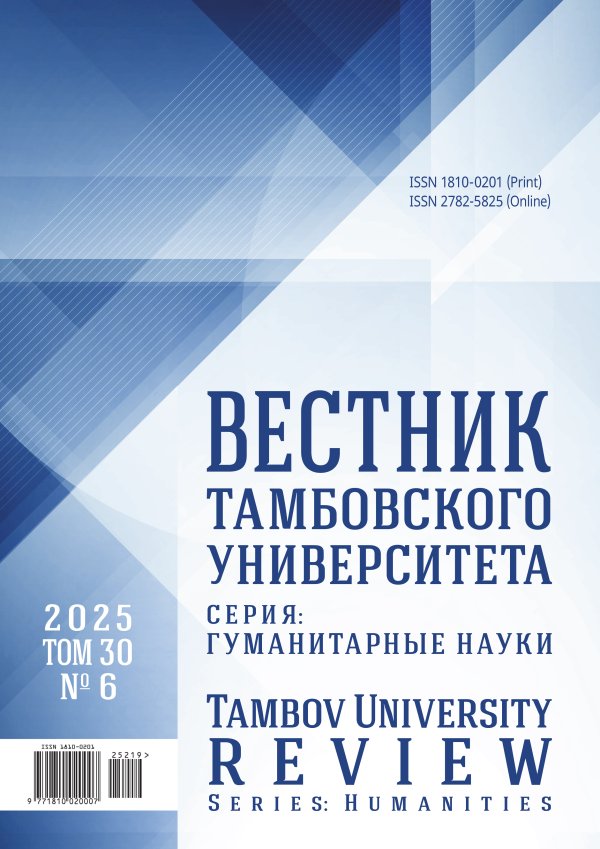Особенности творческого саморазвития подростков с нарушением интеллекта средствами театрального искусства
- Авторы: Кондрашкина Е.В.1, Шаршов И.А.1
-
Учреждения:
- ФГБОУ ВО «Тамбовский государственный университет им. Г.Р. Державина»
- Выпуск: Том 29, № 3 (2024)
- Страницы: 699-707
- Раздел: ПЕДАГОГИКА СРЕДНЕГО И ДОШКОЛЬНОГО ОБРАЗОВАНИЯ
- URL: https://journal-vniispk.ru/1810-0201/article/view/297834
- DOI: https://doi.org/10.20310/1810-0201-2024-29-3-699-707
- ID: 297834
Цитировать
Полный текст
Аннотация
Актуальность. Проблема творческого саморазвития подростков с ОВЗ является очень актуальной, поскольку социальная адаптация таких подростков подразумевает сложность взаимодействия с окружающими, характеризуется несформированностью навыков самопознания, самоорганизации, саморегуляции, других механизмов саморазвития. В частности, творческое саморазвитие подростков с нарушениями интеллекта связано с развитием мышления, моторики, коммуникативных функций. Это возможно посредством любительского театра как формы социально-педагогической работы с молодыми людьми с инвалидностью. Цель исследования – определить роль и педагогические возможности любительского театрального искусства как средства творческого саморазвития подростков с ОВЗ с учетом специфики подростков с нарушением интеллекта (умственной отсталостью).Методы исследования. Использовались такие теоретические методы, как обобщение, сравнение и др., изучались отечественные психолого-педагогические труды в области театральной педагогики, применялись эмпирические методы – осмысление опыта работы с участниками психотерапевтического театра «Мы».Результаты исследования. Выявлено и обосновано, что любительский театр является средством творческого развития и саморазвития личности, то есть той средой, где в полной мере может реализоваться деятельность, направленная на личностное становление подростков с ОВЗ на основе имеющегося личностного потенциала в соответствии с принятыми в обществе нормами морали и культурологическим контекстом. Педагогические возможности театрального искусства, реализуемые в конкретных формах работы (тренинги, этюды, действенный анализ пьесы, постановочная работа и др.) и используемые на различных этапах организационно-творческой деятельности любительского театрального коллектива, способствуют развитию соответствующих навыков самопознания и самоорганизации, мышления, коммуникативных способностей подростков с нарушением интеллекта (умственной отсталостью).Выводы. Применение результатов исследования способствует развитию новых методов и средств педагогической работы с молодыми людьми с ОВЗ, формированию эффективной творческой среды для их творческого саморазвития и социальной адаптации.
Об авторах
Е. В. Кондрашкина
ФГБОУ ВО «Тамбовский государственный университет им. Г.Р. Державина»
Email: alena7kondra@gmail.com
ORCID iD: 0009-0006-1072-8048
научный сотрудник Центра непрерывного педагогического образования
392000, Российская Федерация, г. Тамбов, ул. Интернациональная, 33И. А. Шаршов
ФГБОУ ВО «Тамбовский государственный университет им. Г.Р. Державина»
Автор, ответственный за переписку.
Email: silans@mail.ru
ORCID iD: 0000-0002-2844-0185
доктор педагогических наук, профессор, профессор кафедры педагогики и образовательных технологий
392000, Российская Федерация, г. Тамбов, ул. Интернациональная, 33Список литературы
- Болдырев А.И. Эпилептические синдромы. М.: Медицина, 1976. 262 с.
- Афонин А.Б. «Особый театр» как жизненный путь. М.: Городец, 2017. 156 с.
- Рубцова О.В., Сидоров А.В. «Особый театр» как средство социальной инклюзии: зарубежный и отечественный опыт // Культурно-историческая психология. 2017. Т. 13. № 1. С. 68-80. https://doi.org/10.17759/chp.2017130107, https://elibrary.ru/zbbtxf
- Гройсман А.Л. Личность, творчество, регуляция состояний. М.: Изд-во «Магистр», 1998. 430 с.
- Богоявленская Д.Б. Психология творческих способностей. М.: Федоров, 2009. 414 с. https://elibrary.ru/qxypqz
- Сатир В. Коммуникация в психотерапии. М.: Ин-т общегум. исследований, 2011. 80 с. https://elibrary.ru/qybzgr
- Сельченко К.В. Психология художественного творчества. Минск: Харвест, 1999. 166 с.
- Шаршов И.А. Профессионально-творческое саморазвитие личности: сущность и технология. Москва; Тамбов: Изд-во Тамб. гос. ун-та им. Г.Р. Державина, 2003. 146 с.
- Грачева Л.В. Психотехника актера. СПб.: Лань; Планета музыки, 2015. 381 с.
- Макарова Л.Н., Козодаев П.И. Творческое саморазвитие студентов средствами любительского театрального искусства. Москва; Тамбов: Изд-во Тамб. гос. ун-та им. Г.Р. Державина, 2006. 152 с.
Дополнительные файлы









